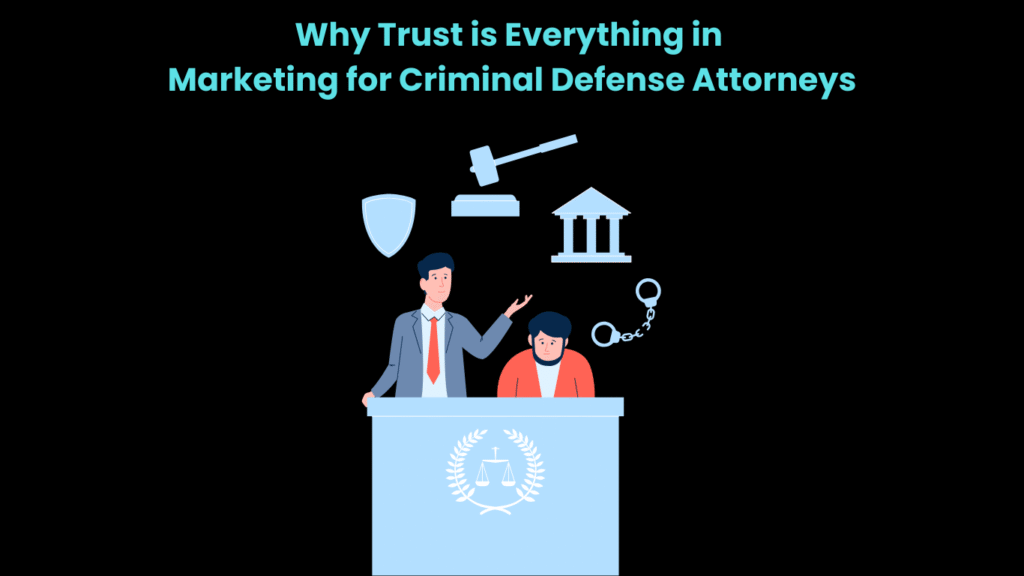Criminal defense clients face some of the most stressful and frightening situations possible, often dealing with potential jail time, job loss, and family consequences that can destroy their lives. Unlike other legal practice areas where clients have time to research and compare options, criminal defense often involves urgent decisions made under extreme pressure.
Traditional marketing approaches that work for other types of lawyers often fall flat with criminal defense clients who need reassurance more than impressive credentials or flashy advertising. Trust drives hiring decisions because clients must believe their attorney will fight for them during the most vulnerable moments of their lives.
Understanding why credibility matters so much when marketing for criminal defense attorneys helps firms develop strategies that actually connect with potential clients. Smart criminal defense lawyers recognize that building trust requires different approaches than typical legal marketing because the stakes and emotions involved are completely different.
The Unique Needs of Criminal Defense Clients
Fear dominates the mindset of most criminal defense clients who face potential incarceration, probation, fines, and permanent criminal records that affect employment, housing, and family relationships. This fear makes clients extremely cautious about attorney selection because choosing the wrong lawyer could result in life-altering consequences.
Urgency characterizes many criminal cases where clients need immediate representation before talking to police, attending arraignments, or missing crucial deadlines that affect their cases. This time pressure prevents the careful comparison shopping that clients might do for other legal services. This time pressure prevents the careful comparison shopping that clients might do for other legal services, whether they are searching for a criminal defense attorney or a Seattle Truck Accidents lawyer for urgent legal help.
Privacy concerns affect criminal defense clients who worry about confidentiality and judgment from others if their legal problems become public knowledge. These clients prefer attorneys who demonstrate discretion and professionalism rather than those who might publicize their cases for marketing purposes.
Clients seek reassurance and emotional support rather than just legal expertise because criminal charges attack their sense of security and self-worth. They need attorneys who can provide confidence and calm guidance through confusing legal processes that feel overwhelming and threatening.
Building Trust Through Online Presence
Client reviews and testimonials carry enormous weight with criminal defense clients who want to hear from people who faced similar charges and achieved positive outcomes. These authentic voices provide the reassurance that marketing copy and credentials alone can’t deliver to frightened potential clients.
Case results and experience summaries help demonstrate competence while showing potential clients that their attorney, whether for criminal defense or a Phoenix motorcycle accident attorney, has successfully handled similar situations. However, these must be presented carefully to avoid appearing boastful or making unrealistic promises about future outcomes.
Professional but approachable branding strikes the balance between competence and accessibility that criminal defense clients need. Overly formal presentations can seem intimidating while too casual approaches might suggest lack of seriousness about clients’ legal problems.
Website design and content should prioritize clear communication about the legal process, fees, and what clients can expect rather than using legal jargon that confuses and intimidates people who are already stressed about their situations. Tools like Digest PH’s ai legal research assistant can also help criminal defense attorneys create accurate, well-cited legal content that strengthens their credibility.
Transparency in Communication and Pricing
Clear fee structures and payment options reduce client anxiety about legal costs during already financially stressful times. Criminal defense clients often face job loss or reduced income due to their charges, making payment flexibility and transparency crucial for building trust and accessibility.
Honest discussions about case strengths and weaknesses help clients develop realistic expectations rather than false hope that can damage attorney-client relationships when outcomes don’t match expectations. This transparency builds confidence in attorney judgment and preparation.
Accessibility through multiple communication channels allows clients to reach their attorneys when questions or concerns arise during cases that can drag on for months. Responsive communication demonstrates that attorneys prioritize client needs and understand the stress their situations create.
Regular case updates help clients feel informed and involved in their defense rather than feeling like passive observers of processes that will determine their futures. This ongoing communication builds trust while reducing the anxiety that comes from uncertainty about case progress.
Read More: Why Cybercriminals Target Small Businesses More Than Ever
Conclusion
Criminal defense marketing succeeds when it prioritizes trust-building over traditional legal marketing approaches that emphasize credentials and achievements. Clients facing criminal charges need emotional reassurance and demonstrated competence more than impressive office locations or awards.
Understanding the unique psychological needs of criminal defense clients helps attorneys develop marketing strategies that actually connect with their target audience. This means focusing on reliability, accessibility, and proven results rather than generic legal marketing approaches.
Trust converts leads into clients in criminal defense because people hire attorneys they believe will fight for them during the most frightening experiences of their lives. Smart marketing builds this trust through authentic communication and demonstrated understanding of client fears and needs.




